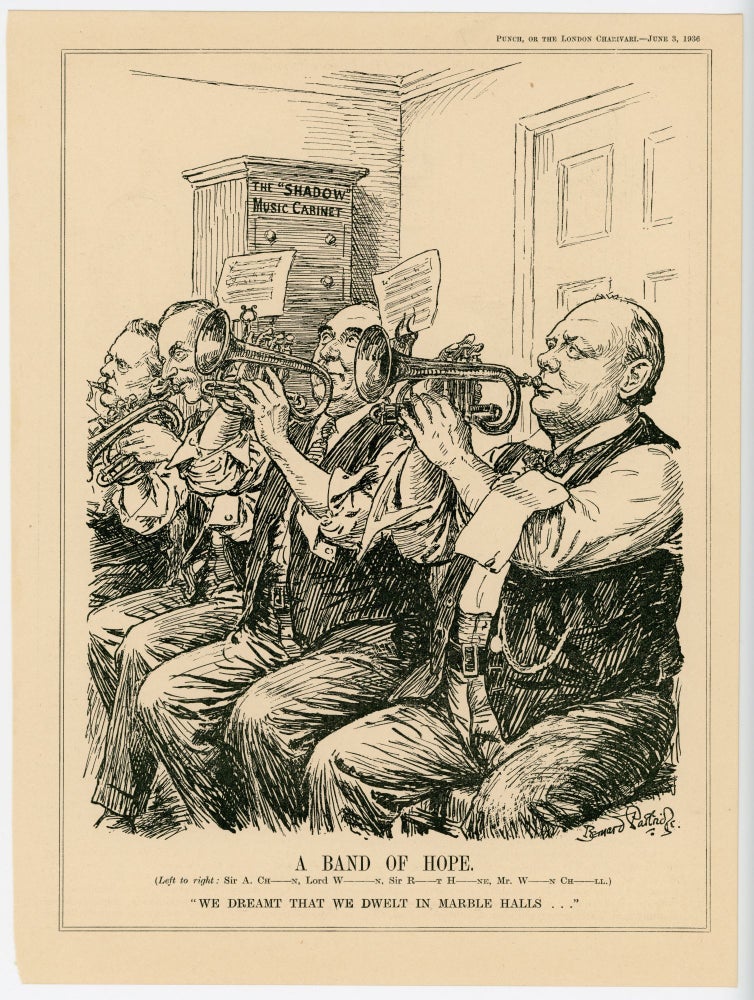A BAND OF HOPE. - an original printed appearance of this cartoon featuring Winston S. Churchill from the 3 June 1936 edition of the magazine Punch, or The London Charivari
London: Punch, 1936. This original printed appearance of a Punch cartoon featuring Winston S. Churchill comes from the personal collection of Gary L. Stiles, author of Churchill in Punch (Unicorn Publishing Group, 2022). His book is the first ever effort to definitively catalog, describe, and contextualize all of the many Punch cartoons featuring Churchill.
This cartoon titled "A BAND OF HOPE." appeared thus on p.631 of the 3 June 1936 issue of Punch. The artist is Bernard Partridge. The cartoon is captioned "(Left to right: Sir A. Ch----bn, Lord W---n, Sir R----t H---ne, Mr. W---n Ch---ll.) ' WE DREAMT THAT WE DWELT IN MARBLE HALLS...'"
In 1936, Churchill was in the midst of his "wilderness years", a decade he spent out of power and out of favor, often at odds with both his own Conservative Party and prevailing public sentiment. This was one of the first positive Punch cartoon depictions of Churchill in quite some time. Here the four Conservative Leaders, Austen Chamberlain, Lord Winterton, Robert Horne, and Winston Churchill, all of whom were excluded from the Government by Prime Minister Baldwin, are acting as a shadow Cabinet, keeping the public and House ever aware of the risk of Hitler and Germany.
In 1931, Churchill had begun what would become a decade spent out of power and out of favor, frequently at odds with both his own Conservative Party and prevailing public sentiment. In early 1931 Churchill broke with his Party over the India Bill. Churchill spent formative time as a young 19th century cavalry officer fighting on the northwest Indian frontier, about which he would write his first published book. He certainly did not adopt an early progressive attitude toward relinquishing control over the crown jewel of Britain's colonial empire. Nonetheless, it is instructive to remember that many of Churchill's dire warnings about Indian independence proved prophetic. Churchill had warned that too swift a British withdrawal from India would lead to bloody civil war and sectarian strife between Hindus and Muslims, Hindu domination, and destabilizing political balkanization of the subcontinent. All these predictions came to pass and, to a considerable extent, persist today.
Punch or The London Charivari began featuring Churchill cartoons in 1900, when his political career was just beginning. That political career would last two thirds of a century, see him occupy Cabinet office during each of the first six decades of the twentieth century, carry him twice to the premiership and, further still, into the annals of history as a preeminent statesman. And throughout that time, Punch satirized Churchill in cartoons – more than 600 of them, the work of more than 50 different artists.
It was a near-perfect relationship between satirists and subject. That Churchill was distinctive in both persona and physical appearance helped make him easy to caricature. To his persona and appearance he added myriad additional satirical temptations, not just props, like his cigars, siren suits, V-sign, and hats, but also a variety of ancillary avocations and vocations, like polo, painting, brick-laying, and writing. All these were skewered as well.
Some Punch cartoons were laudatory, some critical, and many humorous, like the man himself. Nearly always, Churchill was distinctly recognizable, a larger-than-life character whose presence caricature served only to magnify. Item #007158
Price: $75.00

